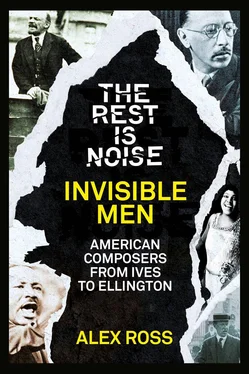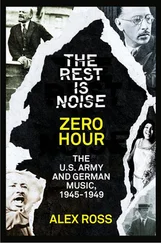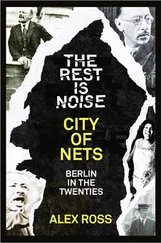Separateness became a source of power; there were other ways to get the message out, other lines of transmission. Black musicians were quick to appropriate technologies that classical music adopted only fitfully. The protagonist of Ralph Ellison’s epochal novel Invisible Man sits in his basement with his record player, listening to “(What Did I Do to Be So) Black and Blue.” He says, “Perhaps I like Louis Armstrong because he’s made poetry out of being invisible.” The invisible man broadcasts on the “lower frequencies” to which society has consigned him. Incidentally, Ellison once thought of becoming a composer. He took a few lessons from Wallingford Riegger, an early American admirer of Schoenberg. Then, like so many others, he stopped.
To tell the story of American composition in the early twentieth century is to circle around an absent center. The great African-American orchestral works that Dvořák prophesied are mostly absent, their promise transmuted into jazz. Nonetheless, the landscape teems with interesting life. White composers faced another, far milder kind of prejudice; their very existence was deemed inessential by the Beethoven-besotted concertgoers of the urban centers. They tried many routes around the intractable fact of audience apathy, embracing radical dissonance (Charles Ives, Edgard Varèse, Carl Ruggles), radical simplicity (Virgil Thomson), a black-and-white, classical-popular fusion (George Gershwin). For the most part, the identity of the American composer was a kind of non identity, an ethnicity of solitude.
Aaron Copland, whose story will be told in later chapters, once pointed out that the job of being an American artist often consists simply in making art possible—which is to say, visible. Every generation has to do the work all over again. Composers perennially lack state support; they lack a broad audience; they lack a centuries-old tradition. For some, this isolation is debilitating, but for others it is liberating; the absence of tradition means freedom from tradition. One way or another, all American composers are invisible men.
Will Marion Cook
The early history of African-American composition, at the end of the nineteenth century and the beginning of the twentieth, is full of sorrowful tales. Scott Joplin, the composer of “Maple Leaf Rag” and “The Entertainer,” spent his last years in a futile effort to stage his opera Treemonisha, which vibrantly blended bel canto melody and rag rhythm. Syphilis invaded Joplin’s brain, and he died insane in 1917. Harry Lawrence Freeman, the found er of the Negro Grand Opera Company in Harlem, wrote two Wagnerian tetralogies with black characters, only one part of which was ever staged. Saddest of all, perhaps, was the case of Maurice Arnold Strothotte, whom Dvořák singled out as “the most promising and gifted” of his American pupils. Arnold’s American Plantation Dances was played at a National Conservatory concert in 1894 to much applause. The conductor-scholar Maurice Peress has shown that Dvořák’s familiar Humoresque borrowed from an episode in Arnold’s work. The conservatory concert was, unfortunately, the high-water mark of the young man’s career. He continued writing music—an opera titled The Merry Benedicts, music for silent films, an American Rhapsody, a Symphony in F Minor—but performances were few. Instead, he made a living conducting operetta and teaching violin. Like the hero of James Weldon Johnson’s Autobiography of an Ex-Colored Man, he apparently stopped identifying as black, living out his final years in the heavily German neighborhood of Yorkville. Oblivion engulfed him all the same.
Other stories had happier endings. The little-known life of the violinist, composer, conductor, and teacher Will Marion Cook serves as a useful case study in the development of African-American music from 1900 to 1930. If this charismatic, obstinate personality ultimately failed in his quest to conquer the classical realm, he did experience moments of triumph, and blazed a separate trail for many black artists who followed him. Among other things, he forms a direct link between Dvořák and Duke Ellington.
Cook’s biography, sketchily documented, has been pieced together by the scholar Marva Griffin Carter. Born in 1869, Cook grew up in Washington, D.C., the son of middle-class parents. When his father died, he went to live with his grandparents in Chattanooga, where his arrogance created the sorts of disciplinary problems that are often noted in youngsters of unusual talent. He used to go to the top of Lookout Mountain, outside Chattanooga, to plot his future fame. In his unpublished autobiography, he wrote: “I would ... remain there till late at night, planning my whole life, how I would study, become a great musician, and do something about race prejudice ... Somehow I felt that such music might be the lever by which my people could raise their status. All my life I’ve dreamed dreams, but never more wonderful or more grandiose dreams than those inspired by Lookout Mountain.”
Cook was then accepted into Oberlin, one of very few American colleges where black students could enroll alongside whites. A professor noticed his skill as a violinist and advised him to study with Joseph Joachim, who headed the Hochschule für Musik in Berlin. With some assistance from the slave-turned-orator Frederick Douglass, who belonged to Mrs. Cook’s social circle, the boy gained admittance to Joachim’s academy.
The Kaiser’s Berlin proved surprisingly welcoming. According to the autobiography, titled Hell of a Life, Joachim took the young African-American under his wing, expressing a liking for his passionate playing and his untamed personality. “You are a stranger in a strange land,” the violinist supposedly said. “We are going to become friends. Come to my house for lunch Sunday.” At Joachim’s gatherings Cook could have met or glimpsed many of the leading personalities of German music, including Hans von Bülow and the young Richard Strauss. In the winter of 1889, none other than Johannes Brahms came to the Hochschule to celebrate Joachim’s fiftieth anniversary as a performer. In all, Cook seems to have enjoyed his time in Germany; the sight of a black violinist was apparently too exotic to arouse racial fears.
Compare the experiences of W. E. B. Du Bois, who began studying economics and history in Berlin just as Cook left. According to David Levering Lewis’s biography, Du Bois “felt exceptionally free” during his Berlin sojourn—“more liberated ... than he would ever feel again.” On a train ride to Lübeck, Du Bois sang Beethoven’s “Ode to Joy”—“All men will be brothers”—and dreamed of a better world. The young philosopher also became enamored of the Wagner operas, gaining from them an appreciation of how art could inflame national and racial spirit. In his story “Of the Coming of John,” which appeared in The Souls of Black Folk, a Southern youth named John Jones attends a performance of Lohengrin and feels in it the contours of a better life: “A deep longing swelled in all his heart to rise with that clear music out of the dirt and dust of that low life that held him prisoned and befouled. If he could only live up in the free air where birds sang and setting suns had no touch of blood!” Then—here Du Bois reveals his “double-consciousness,” his awareness of how even the most “cultured” black man is perceived—an usher taps John on the shoulder and asks him to leave.
That tap on the shoulder, metaphorical or not, Will Marion Cook came to know well when he returned to America. He tried to make his name as a violinist, advertising himself improbably as a “musical phenomenon performing some of the masterpieces upon his violin with one hand.” Making little headway, he then formed the William Marion Cook Orchestra, with Frederick Douglass as honorary president. At around the same time, Cook wrote, or began writing, an opera based on Harriet Beecher Stowe’s Uncle Tom’s Cabin. Most significantly, in 1893, he went to Chicago to participate in the World’s Columbian Exposition, a momentous event at which America declared its new status as a world power. In an effort to counteract the stereo types of black savagery that figured in some of the fair’s displays—crowds flocked to watch and hear the African drummers of Dahomey Village—Douglass organized a Colored People’s Day, which aimed to affirm the nobility of the black American experience. Newspapers mocked Douglass by speculating that watermelons would be sold in bulk.
Читать дальше












